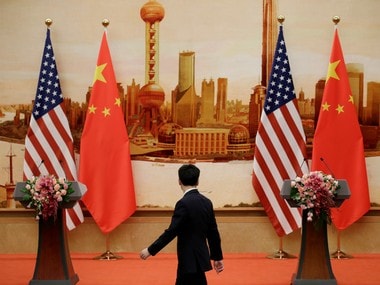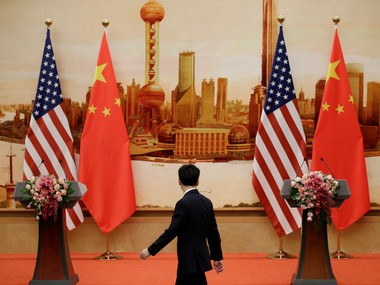The US Treasury Department is drafting curbs that would block firms with at least 25 percent Chinese ownership from buying US companies with “industrially significant technology,” a government official briefed on the matter said on Sunday, according to a news report. The report prompted Dhruva Jaishankar, Fellow in Foreign Policy Studies at Brookings India in New Delhi and the Brookings Institution in Washington DC to tweet: Fasten your seatbelts, it’s going to be a bumpy ride.
Fasten your seatbelts, it's going to be a bumpy ride. pic.twitter.com/rCUXODAnc0
— Dhruva Jaishankar · ध्रुव जयशंकर (@d_jaishankar) June 25, 2018
Dhruva is the son of S Jaishankar, India’s former foreign secretary who is Tata Group’s president of global corporate affairs. The article that Dhruva is referring to is the news report which hints at the USA considering limiting Chinese investment in tech firms. According to a Reuters report, the US Treasury Department is drafting curbs that would block firms with at least 25 percent Chinese ownership from buying US companies with “industrially significant technology,” a government official briefed on the matter said on Sunday. The official, whose comments matched a report by the Wall Street Journal, emphasized that the Chinese ownership threshold may change before the restrictions are announced on Friday. The move marks another escalation of President Donald Trump’s trade conflict with China, which threatens to roil financial markets and dent global growth. [caption id=“attachment_4591281” align=“alignleft” width=“380”]  A staff member walks past US and Chinese flags placed for a joint news conference by US Secretary of State Mike Pompeo and Chinese Foreign Minister Wang Yi at the Great Hall of the People in Beijing, China on 14 June, 2018. Reuters[/caption] Tariffs on $34 billion worth of Chinese goods, the first of a potential total of $450 billion, are due to take effect on 6 July over US complaints that China is misappropriating US technology through joint venture rules and other policies. The Treasury investment restrictions are expected to target key sectors, including several China is trying to develop as part of its “Made in China 2025” industrial plan, the US official said. Among its objectives, the plan aims to upgrade China’s capabilities in advanced information technology, aerospace, marine engineering, pharmaceuticals, advanced energy vehicles, robotics and other high-technology industries. The Wall Street Journal also said the US Commerce Department and National Security Council were proposing “enhanced” export controls to keep such technologies from being shipped to China. Spokespersons for the Treasury, Commerce Department and the White House did not immediately respond to Reuters’ requests for comment on the proposed restrictions. The government official said the Treasury would invoke the International Emergency Economic Powers Act of 1977 (IEEPA) to devise the restrictions. The act gives the president sweeping authority to restrict assets based on national security concerns. IEEPA was invoked broadly after the 9/11 attacks in 2001 to cut off financing for terrorist networks. The Journal said the administration would look only at new deals and would not try to unwind existing ones, adding that the planned investment bar would not distinguish between Chinese state-owned and private companies. The White House on 29 May said the Trump administration would press ahead with restrictions on investment by Chinese companies in the United States as well as “enhanced” export controls for goods exported to China, with details to be announced by 30 June. It also said it would unveil a revised list of Chinese goods for tariffs, which it did on 15 June. --With inputs from Reuters


)

)
)
)
)
)
)
)
)



